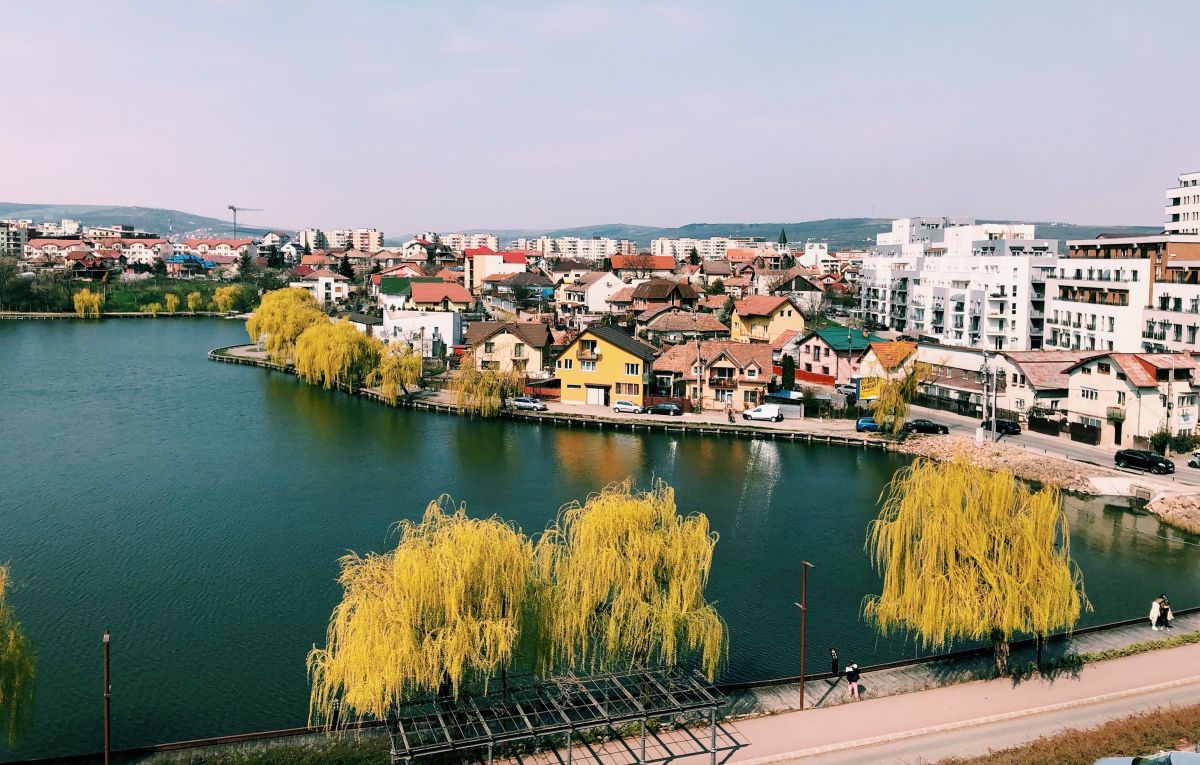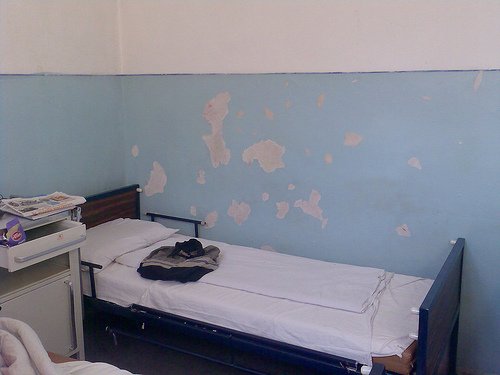Romania is considered by more and more people as a great country to retire to. This is because of the low cost of living (despite skyrocketing prices), its natural beauty, the fact that it is an EU member and hopefully a Schengen member in the near future,
Today we’re going to go through the Pros and Cons of retiring to Romania so that you can decide, knowing both sides of the story, if it is indeed the perfect country for you and if it’s worth the trouble of going through with all the bureaucracy to stay here.
If you don’t want to read through all the reasons for and against retiring here, I will try to sum it down for you in one paragraph, with the biggest and most important on each side.
The biggest Pro of retiring to Romania is the low cost of living, followed by its natural beauty and friendly people. The biggest con is that Romania doesn’t offer a retirement visa per se, so you would have to do some extra leg- and paper-work to get here.
But there is a lot more than just these factors to consider, so it’s best to actually check them all out in my list of Pros and Cons of retiring to Romania.
I will try to keep this list as up to date as possible (with answers to any possible questions that arise), so don’t hesitate to send them over if you have them!
Pros of retiring to Romania
I always like to look at the good things, so that’s exactly what we’re going to start with – all the things that will make you happy with Romania.
1. It’s a very cheap country, by Western standards

Compared to Western Europe, the US, Canada and Australia, Romania is very cheap.
You can see my actual monthly expenses in Romania here, as well as the more generic Cost of Living in Romania article to get a better view of prices here and how much you will end up spending.
But the point is that your Dollars (or Euros, or other foreign currency) will go a longer way here.
Romania is getting more and more expensive and compared to several years ago, prices have increased tremendously (in some cases, when it comes to food items, they have doubled!) but overall the country remains one of the cheapest in Europe.
2. Housing / rent is cheap
This is part of the #1 reason above, but I just wanted to highlight it to make it clear that one of the most important expenses in our budget – monthly rent (or mortgage) is actually a lot lower in Romania than it is in the rest of the world.
Prices have shot up here as well and you will no longer be able to buy a house in Romania in a large city for under $100,000 (at least not one that is move-in ready), but you can still find some amazing deals here.
In smaller cities, you can still find a one bedroom apartment for as low as $40,000 (although $10,000 more would give you more options), while rent for a similar place can be as low as $300 per month.
I was checking the larger cities and you can easily find a decent two-bedroom apartment there for around $600 and even cheaper if you move outside of the main areas of the city.
In other words, one of the biggest monthly expenses – rent – will be reduced a lot if you choose Romania as your place to live in.
3. Romania is a safe country
Despite what you might believe you know, Romania is a generally safe country. You won’t get robbed, kidnapped or murdered here.
People are not normally carrying guns and although we do have some petty crimes, the country is really safe and has almost zero gun-related violence.
I wrote an analysis of how dangerous is Romania in a previous article, so you can read more on that matter if you want even more details.
4. Most of the people speak English

English is the main second language taught in schools (or at least the third one) so most people will have at least conversational skills in English.
Maybe you won’t be able to start a philosophical conversation with all Romanians (in English), but small talk would be OK.
Things change in the villages where most people won’t speak English… but even so, you still have higher chances of being understood by at least a few people in a village.
Even more, with the world switching around these years, many people that went in foreign countries to work came back in Romania with at least some English knowledge – so now more than ever you will have people speaking the language everywhere.
However, don’t expect them to speak a lot of other languages, although there’s still a surprisingly high number of people who can speak at least a bit of Italian, Spanish or French.
5. Movies are not dubbed
Not really the biggest reason to retire to Romania, but it does matter to many, I would say.
Most English movies (except for the animation ones made for kids) are not dubbed, but have subtitles instead.
So you won’t have any trouble understanding Home Alone 1 and 2 every year around Christmas (you’ll see that Home Alone is the traditional Christmas movie here).
It also helps you a lot in learning Romanian faster, since you would have the subtitles at the bottom of the screen.
6. Romanian cities are very walkable
Say goodbye to fuel costs if you decide to Retire in Romania! Except for Bucharest which is huge, most of the other cities here are pretty much walkable – including the larger ones.
Or at least they are a short bike ride away.
However, since you’ll be moving here, you will have the option to choose where to live in a city: choose a central or semi-central area and you won’t have to ride a car or bus or anything ever, because you’ll have anything you want minutes away.
I, for example, live in one of the most underrated smaller cities in Romania – Drobeta Turnu Severin – and everything is within walking distance.
We only drive about twice per month to stock up on groceries from one of the multiple hypermarkets available here (which are on the outskirts of the city) but even before that, when we didn’t have a car, a taxi ride to the supermarket and back home was around $4 (so $2 per fare).
7. Romanian food is delicious
Mostly based on pork and chicken (beef is rarely consumed here), Romanian food is really delicious and extremely easy to prepare.
Traditional Romanian food is not the healthiest in the world, but it sure tastes good and the shopping basket won’t ruin your budget.

Want to see more traditional Romanian foods? This article will surely make you hungry!
8. Romanians are friendly towards foreigners
Most of the people living in Romania still have that American Dream and consider the US to be the best place in the world (thank you, Hollywood, for that!) so meeting somebody from the States is almost like a dream come true for many.
But even if you are from a different foreign country, most Romanians will go above and beyond to make you feel welcome.
Every foreigner that I know was extremely happy and surprised with how great hosts Romanians want to be.
It’s not uncommon for them to take you to their home and set up a feast for you just because you are a foreigner and you have to feel welcome (this would happed mostly in villages, but still good!)
9. Romania is beautiful
Romanian villages are as raw and traditional as possible, even though you will still have great internet and mobile signal and, generally speaking, all if not most of the amenities of the modern world.
Angela spend some months in a village in Transylvania and shared her complete experience – make sure to read that piece, it’s pure gold for any foreigner looking to retire to Romania (or just spend some time here).

The country also has 7 Unesco World Heritage sites, the best preserved delta in Europe (Danube’s Delta), the largest rock sculpture in Europe (a 20 minutes ride from my city, so make sure to leave a sign if you visit!) and much, much more.
There hasn’t been a single person visiting from abroad that wasn’t blown away with the natural beauty of Romania.
10. Private health care options are cheap
Although you’ll find the “health care” part at the cons below, private health care is really cheap here.
A visit to the doctor can be as low as $30 (but usually around $40) and most of the private hospitals/clinics are very modern, even in the smaller cities.
Monthly options start at around $50 per month per person and even though they aren’t the most complete options available, you will find out that you will generally spend a lot less overall than you do in most other Western countries, especially the US.
Cons of retiring in Romania
Like anywhere else in the world, there are some disadvantages that you have to consider before coming here.
And even though we have fewer Cons than Pros (at least based on my analysis), you will see that the top one is really big and important – and a potential deal breaker for those outside of the EU. So let’s check them out below!
1. No retirement visa or options
People coming from any EU country should simply skip this, as it doesn’t apply to them.

But if you’re coming from the US (or any country outside of the EU), you will find it pretty difficult to actually retire here because there is no retirement Visa available and no other easy way of getting that residence permit (like a self-sufficient visa or anything).
However, you can still get creative, spend a bit more and set up a company in Romania – start it with minimal funds and activity – and be allowed to stay here based on that.
There are other options available, but none as easy as a retirement visa (or anything similar) would be. I wrote more in depth about the process of getting your residence permit in Romania here – so make sure to check it out for all the details that you need to know.
2. Corruption is still present
Although this wouldn’t directly impact you as a retiree, it’s worth knowing that corruption is still present in Romania, although things have improved a lot over the years.
But you might still be able to avoid a speeding ticket if you give some money to a police officer and in many cases, offering a financial gift to state employees will ensure that you are at least served in time, if not better than those who give no gifts.
The “good” thing is that the people who expect such “gifts” will usually say it outright, so you won’t have to wonder if you’re expected to give something extra or not.
In most cases though, you won’t be expected to bribe anybody in order to get things done, but have in mind that there’s still a small possibility that you might have to.
3. Customer service sucks
Don’t expect to walk into a store and be greeted by a smiling sales person. That will usually not happen even in a restaurant or pub or whatever, where people generally depend on your tips.
Customer service sucks in Romania and smiles are not common here. You will be surprised that in most cases, people you interact with – stores, restaurants, official buildings, doctors, anything – will be outright rude and lacking manners.
It is unfortunately just how things are. (There are fortunately exceptions to the rule and things are improving, but we’re still faaar away from perfect here).
4. Public health care is generally a miss
Public hospitals are generally in a bad shape, are poorly equipped (and have old equipment), are generally understaffed and overcrowded.
Plus, there’s always the chance of you getting a hospital-acquired and potentially life-threatening infection there (one of many sources here).
These are usually related to surgery though, so risks for getting them are minimal if you just go there for routine checks or other problems.
Still, the public health care system is still pretty much terrible in Romania (although it is improving) and most likely you will do much better with a private clinic or hospital which offer an experience much closer to what you’d expect to get in Western countries.
5. Low to no opportunities to get hired
If you’re retiring to Romania, this shouldn’t be a real problem, but don’t expect to be able to make much extra income here unless you have an online/offline business elsewhere.
Although minimum and average wages are growing in Romania, they are still low by Western standards.
And unless we’re talking about a job as a teacher (native English speakers are highly sought after right now!), finding a job will be difficult – especially one that is paid well and doesn’t require you to speak Romanian.
6. Poor public transportation and infrastructure
The big cities do offer a bit more in this area, but expect to ride old buses with no air conditioning, crowded and generally late.
Trains in Romania are almost always late, roads are generally bad, there are not enough parking spots and the general experience here will not be on your top favorites list for sure.
Smaller cities lack public transportation options almost entirely – in my city, there are just several bus stops scattered throughout the city and you can wait anything between 30 to 45 minutes for a new bus to arrive.
On the brighter side, walking to your destination is really an option, as well as the taxi if you’re in a hurry, as we talked already.
Conclusion
You now know both the Pros and the Cons about retiring to Romania. Generally, I would say that the former outweigh the latter, but we still have that huge #1 Con on the list.
That only applies to people outside of the EU (for those in the European Union is just a formality to retire or move here) and you can still get creative about it, but it does involve more bureaucracy and stress – which is something you might not want during your retirement years.
What do you think about the list above though? Good enough reasons to retire to Romania or the Cons are too much for you? Let me know by sharing your thoughts below!
- List of the International Airports in Romania (with Map) - April 25, 2024
- Beach, Please Festival 2024: Lineup, Schedule & Dates [Updated April 24] - April 24, 2024
- Best Music Festivals in Romania – with Dates & Lineups [2024 Update] - April 17, 2024



Thanks for the great information with regards to retirement options in Romania. I will have to do some homework and check out Bucharest. I am looking for an affordable home base for the ability to travel Europe and see as much as I can. Many other countries I checked (Germany, Austria, Denmark, and Malta appear to be expensive with lots of hoops to jump through to relocate. The big 3 are affordability, health insurance and enough English speakers to be able to buy food and live without a full time interpreter. I have a monthly income of 5K and savings of 50K. I am 63 and need to find out if the wanderlust is possible or just a pipe dream. Our current leader in the USA is a bad omen of more bad things to come. I want to enjoy what time I have left. Any insights (brutally honest are best) would be appreciated. Single man, no kids, wife or anything else. Thanks again
Hello David,
While Romania would definitely be a good choice, $5k per month would allow you to live a good life in most places in Europe, including Germany and Austria. It’s true that, with that amount of money, you would live like a king in Romania and enjoy all the luxury. It’s never too late to make your dreams come true!
Hello David Gaither,
I am a Romanian lady living in Canada for now, but I am planning to go back to Romania. My advise is . look for some nice places in Transylvania or North Transylvania. The places are mirific and people are much different in comparison with Bucharest. Stay away from Bucharest. It’s just my advise. And believe me: I know what I say. Good luck!
Hi once again,
After three years’ residency in a different country, I really wish to retire to Romania. Knowing the place fairly well, I even know which town I want to live in! But still have qualms about long-stay visas (I’m American.) If one starts a business, I understand that helps and I might just do that- either in horticulture or perhaps historical costume manufacture (for re-enactments, LARP, etc.)- but on a very small scale. For housing, unsure whether to rent or buy. My monthly state pension is small at $472, but my savings is 50K. Any pointers? Number one on the to-do list is to find an English-speaking Romanian notaire or lawyer (?) to represent my interests as far as living in the country. I speak English and French, and a smattering of Romanian from past visits. Thank you very much for any help! Kate
Hello Kate,
As Otto writes below, there is an article about a family moving to Brasov and following the business path: https://www.romaniaexperience.com/moving-from-the-us-to-brasov-romania-the-experience-so-far/ – you can start there and read the follow-ups linked to from the article.
$472 per month is not a lot of money, to be honest, not even for Romania, as long as renting is involved. Buying property would be difficult as well since you will have to spend a minimum of 15,000 Euros for a studio in a small city. The other monthly costs add up (especially the ones that you have with your company), so even those 50k could vanish pretty fast. On the other hand, your business ideas are interesting and might work and make some extra money that would be just enough to help you live a decent life here without worrying about digging into the savings account…
Did you read his article about the American family that moved to Romania. They got a business “visa” and they talk a lot about the process and lawyers needed. You need to search this a bit to find the article. I hope you can live well what you have. It could be challanging as it sounds like $1,000 is more appropriate monthly income to live in Romania. I would highly recomend renting as owning and not being Romanian I believe is not allowed and even if it is.. it would be very hard as Romanians tend to see Americans as wealthy and will seek more money from you for all home repairs etc. Rental you can leave if you don’t like it and it is VERY reasonable pricing. Rent you don’t rent if they try charging too much. Good luck.
Hello, my is Camelia and I am a Romanian citizen. I am 57 years old. I moved to United States 28 years ago and I have a US citizenship as well. I worked as a nurse all of this time and now, I would like to enjoy the years that I have left, do the things that I love.
I have a government pension of $ 2000.00/month and my apartment in Bucharest. I would like to retire in Bucharest and live there on my pension. I have no husband, nor kids, it’s only me my mother and my puppy Papillon.
Can you please give me some advice, I am looking to relocate in Bucharest and live a modest life.
Camelia, I am not really sure what advice to give you. If you have any specific questions, let me know.
All I can say is that even for the more expensive Bucharest, $2,000 should be enough for you and your mother to live a decent life, as long as you already have your apartment in Bucharest.
good article. If you’re willing to accept and understand the way of life in Romania, there’s no better place in the Balkan. We just bought a little farm in a village near Iasi. And hopefully we manage to organise our relocation in December. Everything is cheaper in Romania. For the price what we paid for the entire property, we can’t even buy a carport here in Germany.
Allthough it might seem a big step to retire in Romania as a foreigner; don’t think too much, don’t hesitate too much.. Just do it.
Hello! Nice article! Congratulations!
Is private healthcare good enough? How much a month can private healthcare cost and how does it work? You pay a monthly fee and then whenever you need to use the hospital, you get attended for “free”? Or do you have to pay something on top of the monthly fee as well?
I’m thinking of moving to Timisoara so if you could base your answer on this, I will really appreciate it.
Thanks!
I wrote about this in some other articles, but generally private healthcare is in many situations better than the state one – this goes for most general health-related problems.
Now regarding the second problem, it all depends on what monthly plan you choose: usually, the lower cost ones give you some benefits, like a number of blood test per year and various controls and such, but don’t cover emergencies. In these cases, you will have to pay extra in case you need hospital care. But as I said, it all depends on the plan you sign up for and there are all sorts of options available.
All these points are still true even today in a lot of countries. This applies for Spain as well. I don’t know if property prices will come down though, there are just so many people thinking, or have left “first world countries” for a better, simpler life and they will gobble up properties. The shift is very interesting to watch and experience.
Everybody’s talking about the “bubble” and the incoming crash for three-ish years already. Eventually it will happen, but I don’t think we’re in a bubble. Just prices going up, adjusting to inflation and the influx of foreigners. Curious to see how high they will go 🙂
I am a UK citizen thinking of retiring to Bucharest. Would it assist me if I marry my Romanian lady friend in allowing me to move permanently. Advice very welcome
Definitely, that would make things a lot easier in the long run.
Dear C,
You absolutely nailed all the Pros and Cons, great job, and a big thank you for taking the time to do so, as I know the info is very helpful to anyone considering retiring in Romania. I left Romania twenty years ago and am now a dual citizen. My husband, who is American, has fallen in love with Romania and would like us to consider it for our final destination. I think the idea is definitely worth our careful and thoughtful consideration.
The reason I decided to leave these comments (aside from extending our kudos and thank you for the great article) is for you and your readers to know what is my biggest fear for making this move, as someone who’s spent half of my life there, and half in the U.S. I wanted to share this with your audience, because it came as a complete shock to my husband. My greatest hesitation comes from what you greatly described as Romania’s very poor customer service!
Now, as my husband put it, you’d wonder why in the world this would be one’s greatest fear?!… I’ll try my best to explain. You see, growing up under the communist regime, followed by a decade of democracy, it was very easy for me to put up / accept / deal with the lack of customer service. One doesn’t know what they don’t know. However, once I visited a lot of other, more developed, countries and establishing my life in the U.S., thus experincing first hand what great customer service is like, I am afraid I couldn’t trade it for anything else, or at the very least I’d have a really hard time exchanging it for rudeness. If anyone is interested, I could give dozens of examples of poor customer service from my years in Romania both before my permanent move abroad, as well as during the frequent visits I have made since. The main point is, as an American accustomed with great customer service most of the time, after having experienced bad or lack of it all together, I fear this would negatively impact my golden years in Romania… That is why I’d caution anyone who cares about these things, to perhaps go visit a few times and determine for yourselves if this could be a deal breaker or not.
I’ll end re emphasizing that you absolutely “aced” describing all that Romania can offer in both the “good” and “bad” categories, thank you again for your post!
Thank you for your input, Amalia. It is indeed difficult when you have to face it on a daily basis, but at least it’s improving slowly so hopefully it will be sooner rather than later when this won’t be a problem anymore.
Check out the Philippines.
Hello,
I am Romanian born, but have been living in the USA for 50 years, since the age of 9. I have become disappointed with America and I am considering retiring in Romania. I have a few relatives but otherwise do not know anyone. I am single and my adult children will stay in the US. Will it be difficult to meet people, to be part of a community, to belong?
Hi,
My question is regarding the health care:
If I return to retire in Romania as a Romanian citizen will I be covered for medical services?
I would come back from US/Canada.(left in 90’s)
I imagine I would have to pay a contribution % of my US pension- how much? 10%?
Will I have to pay any additional income tax(from pension)? if yes how much ? %
I am trying to decide between Canada and Romania for where to retire from a financially point of vue and healthcare is very important too.
We live in US, Seattle area and became challenging after I retired a year ago.
Healthcare insurance is about $1000/month before using any services(just the card in the wallet) .
But is not only the cost to consider: the quality of the service is critical.
I am comparing Romania with Canada:
In Canada, British Columbia about 1 hour and a half north from here,
I would have to pay a total of 20% income tax, but health care is included for me as Canadian resident when I repatriate there.
I’ve read somewhere that I would have to pay 10% income tax in Romania for my foreign pension(not on the first 2000lei/month).
In conclusion, if I would have to pay 10% for CAS and another 10% income tax in Romania, it looks to be similar to what I would pay in Canada.
It is true a lot of nostalgia is involved when I think of coming back to Brasov.
My wife is not so enthusiastic as me.
Any thoughts? Please give some advise.
Is this possibly, the ‘salmon instinct’ thing( returning to the life start place)
Thank you! Multumesc!
Hello Dan,
You would indeed have to pay for health tax if your income is higher than $6,100 per year (that’s 12 minimum gross wages). BUT you would only have to pay 10% of the minimum wage in Romania, which translates to around 200 lei per month (around $45).
Regarding the tax, the way it’s calculated is a bit complicated, but you will not have to pay 10% of the entire amount. It’s 10% of anything above 24,000 lei (around $5,300), minus the tax you already pay in Canada. If you can read Romanian, you can see an example on the official ANAF page here: https://static.anaf.ro/static/10/Brasov/Brasov/pensii_strainatate.pdf
So at most you will have to pay 10% income tax (if there’s not tax on your Canadaian pension) on everything above $5,300 and an extra $45 per month for health insurance. But most likely you will get additional deducations from any taxes withheld in Canada, so your final % will be a lot lower than 20%.
And this man was born in Romania
Really 😱
Besides not having an easy Visa process for retirees, Is Romania set up for retirees as far as receiving monthly Social Security payments to a bank? Is a retirees money safe in a Romanian bank? Corruption is mentioned.
Yes, corruption is not a problem when it comes to banks and the banks themselves are safe, with a guarantee for funds up to 100,000 Euros in case the bank goes bankrupt (which never happened in at least 20 years)
I am an American Veteran considering retiring in Romania on a monthly income of $3500 per month. Would this be enough in Bucharest? Are there other cities I should consider? I am only 46 years of age and look to enjoy a quite area that still has the amenities of a larger city.
I lived in Romania for 4 years (2018 – 2022), in the tourism capital of the country (Constanța) and I can tell you that “nearly everyone speaks English” is the biggest lie propagated by EVERYONE in that country. I found that fewer than 3% of the population spoke any English at all, DESPITE the fact that it is apparently mandatory in School now, and of those 3%, fewer than 1% spoke it with any proficiency. Now, the interesting part is, those that spoke it well, would SWEAR that every Romanian spoke English. So… I started challenging my friends, lets walk up and down the boardwalk and try to find people that spoke English… they were shocked at the results. These tests were ran randomly and often, and were always the same– 2.85% spoke any English at all, .9% spoke it well.
2 more thoughts on this. I traveled throughout Romania on my 4 year stay there (2018 – 2022), and I thought Customer Service was, generally, TOP NOTCH. I was VERY impressed with the “go get it” attitude, especially true of the younger people. It was like the days of America in the 1960’s / 1970’s. Maybe you were just rude to the Romanians that served you? I had a great experience in that realm. Try learning a bit of their language, that helps; and it helps if you try to get to know a bit about them without taking too much of their work time. At least in Constanța and Bucruești, I found public transportation to be great. I did not really use it anywhere else. I mean, that would be like going to the smallest one horse town in America and looking for a rapid transit system… not even in the USA does such an infrastructure exist in smaller towns. Again, not sure what you did wrong…but to be fair… of all the faults I found (You were DEAD on about the health care), Transportation and Service were NOT two of them.
Any input on the volunteer visa? I’m a minister in a religion represented in Romania. What exact documentation would I need? Any experiences if that goes smoothly?
Thanks
I’m sorry but the article’s pro’s are outdated – at best, delusional – at worst.
Cost of living – USED to be low, compared to European standards; not anymore. Groceries in Lidl – a supermarket chain present in various European countries – cost the same as in London, for example, where I lived before relocating to Romania a couple of years ago.
This is just one example – presented because it’s easy to compare the same products same size same producer in same supermarket and of same quantity. Please understand the magnitude of this… In London, UK, where the minimum wage is about 5x times higher than minimum wage in Romania, and where the average wage is 7x times than Romania.
Any sort of services – such as hairdressers for example, gym/ pool – are typically more expensive in Romania – than western Europe. In Romania it’s considered a big luxury to go to the gym and stay fit, only the rich people do that [I am not kidding, at all].
My unlimited monthly pool membership in London, UK, cost half of what the same subscription costs me in Iasi, Romania [not even the capital].
“Cities in Romania are walkable” – city centers, correction. The post-communist suburbs of Romanian cities aren’t even paved, and sidewalks are – if they exist – maximum 70cm wide and with parked cars on them anyway.
So please, give me a break with walkability… historical city centers sure are walkable, I agree – but so are ANY historical city centers in ANY European country… the difference is: outside of the city center.
And another difference: Public Transport – appalling in Romania – people rely on cars – that drive on undersized, poorly maintained, congested, dirty, roads – to reach anywhere beyond the very center of cities.
“Private healthcare is affordable” – really?! For whom?! Who wrote this article?! Perhaps a Computer Programmer – earning 6-7x times the average Romanian’s salary?! Give me a break…
“Everyone speaks English” – really?! Does your mother/ father – you who wrote the article?! Correction: everyone learns English in school, nowadays [but that is a very recent phenomenon].
That doesn’t mean they are good at it, master it, will try it, you’ll be able to get-by using only English – outside of major metro areas. In any case – it’s nowhere nearly as widespread as in the Nordic countries for example, Netherlands, Germany, and so on…
My fiancee is foreign, from outside of Europe, for that matter. For 3 months whilst in Romania – major cities [not the capital] – she barely found 5 people to reply to her in English. 5 people – in 3 months living in Romania…
“It’s safe” ?! Depends what you mean by that. There is a 12x times higher chance of being hurt in a car accident in Romania – than anywhere else in Europe. There is a 100x higher chance of being seriously hurt by stray dogs in Romania – than anywhere I’ve ever seen in Europe.
And I could go on… Sure – you won’t get stabbed and there are no terrorists – but that doesn’t make it “safe” per-say, only that there are other kinds of threats… such as the ones mentioned above.
“Romanian food is delicious” – arguably so. There are 7-10 dishes… usually very fat and unhealthy, and that can be found in most places in Eastern Europe/ the Balkans. We [I am Romanian, as you can probably tell] claim they are ours – for example “sarmale” – but so do the Serbs, Greeks, and many others…
How about diversity? How about when you get bored of those 7 dishes and want to taste something else? How easy it is to find let’s say an Indian restaurant in a random Romanian city [not capital, not Top 10]? Or a Mexican restaurant? etc. I will tell you how easy: almost impossible 🙂
And I can go on… but I will stop here…
Biggest myth: that Romania is cheap….
Used to be… 20 years ago… 15… not anymore… don’t believe me – go and see for yourself, before you make any decision.
You are right. Everything here is old, outdated and bureaucratic. Just like the old Communist regimes mode of operation.
You do as you are told and take it or leave it attitude. Cost of living here is way above ones purchasing power. Most families, one of two persons are
working overseas to send money home. .A Poundland supervisor in London told me that the couple could not afford to pay their bills in Romania.
She uprooted and left for good. A ton of firewood here costs $166.00 dollars that will last you 3 weeks at the most. For the poor on 1,800-2,000.00 Ron[average] a month, it is a matter of food or fuel. And there`s plenty of unemployment. And if your a gypsy, the odds are stacked heavily against you.
Remember Romania is still very much a 3rd world country. I remember travelling from Bucharest to Botosan at night recently. Most stations are not lighted
and the station designation is not illuminated. The digital board inside the train is out of action completely. There is no announcement through
the inter-com to tell you your destination nor the one next. So try to keep awake or remind the conductor to wake you up. And if the conductor breaks his/her journey, before your destination, then inform him to remind the next one coming on. Or you miss your destination.
Properties in the small towns are cheap. 12,000 Euro for a two- room apartment. Cant get that anywhere in EU I, think. In UK that wont even buy you
a toilet. The wines and beers are cheap. And the vegetables when in season. That is all I will give “credit for”. Food in the supermarket is not cheap even by UK standards. So decide whether it is a practical trade-offs from where you are living. I think not, for myself.
Most don`t speak English. They expect you to talk in Romanian. Many shops are dismayed at my failure to understand their language and often ignores me. And they are rude. Believe me. Try sign language, a dictionary but best use your Google translator for words or conversation. It helps immensely.
I recently spoke to a police “friend” about the problems encountered. He advice me to sell up my just-acquired property and go home. Food for thought.
3 months visa does not give you much time to make an appraisal of a new country. Maybe give myself a little bit more time. Stay healthy. The health
system here is a hit and miss. And expect the unexpected.
Hi C the Romanian,
I’m an Irish Citizen and am married to a Romanian who has worked in foreign countries most of her adult life. We are now looking into retiring in Romania. As regards Romanian state health insurance, I understand that as we are not employed but retired and getting pensions, we will pay 10% of the minimum wage for this. That’s no probem, but my question is would you anticipate that we would get the state health insurance in return for this payment without any problems once we are resident in Romania, or are there sometimes problems for EU citizens and returning Romanian citizens who have not worked much in Romania to get the state health insurance?
Thanks,
I don’t think there will be any problems getting it – it will become active the moment you start paying. Make sure to also ask them to issue the European Health card (they don’t do so if you don’t ask) to benefit from state health insurance throughout the EU.
Terrific thanks a lot
Good read Calin.
There is one big Con reason for retiring in Romania: Credit / Loans
Banking in Romania is not friendly at all to persons 60 years or older. There are virtually no credit or loans for the elderly. You must use debit or cash wherever you go.
That is a valid point! I did a bit of research and found out that some banks offer credit to seniors (Banca Transilvania, for example), but they currently limit the loan to ~8k Euros.
However, this was an issue I was not aware of – thanks for pointing it out!